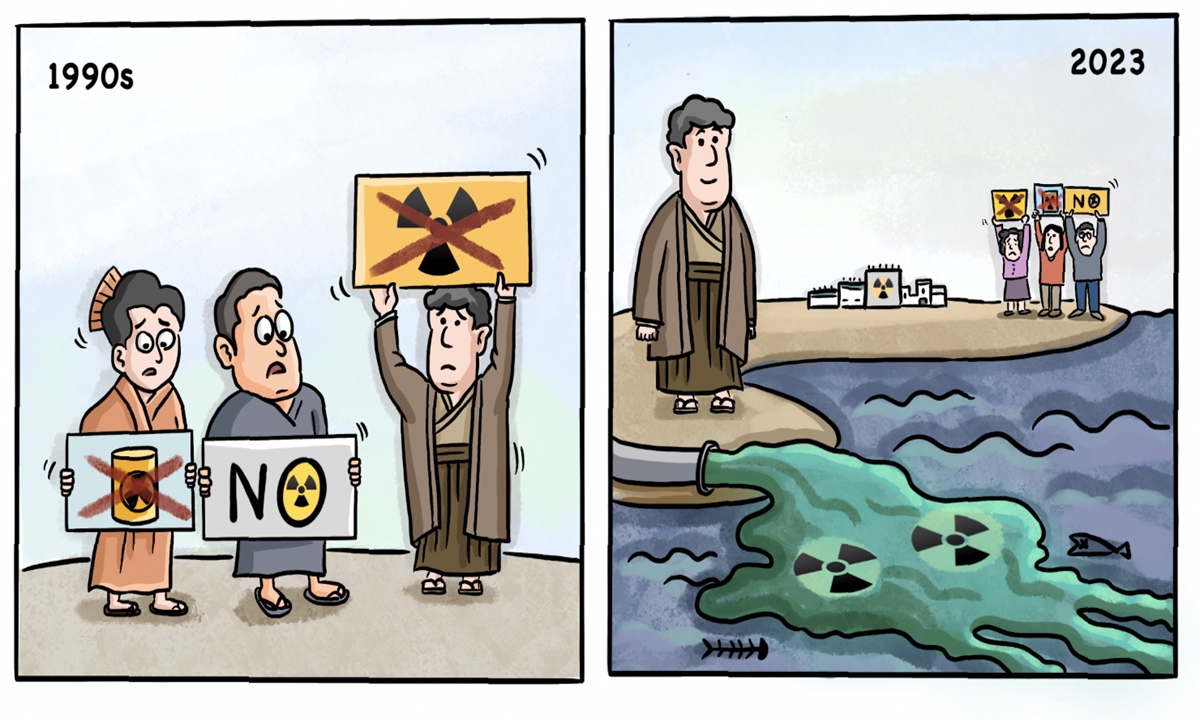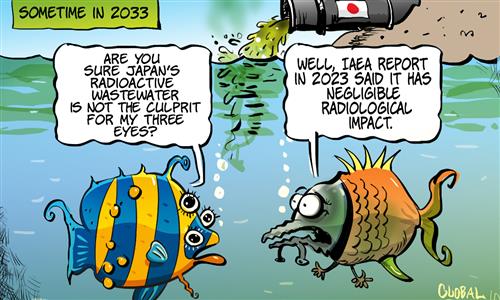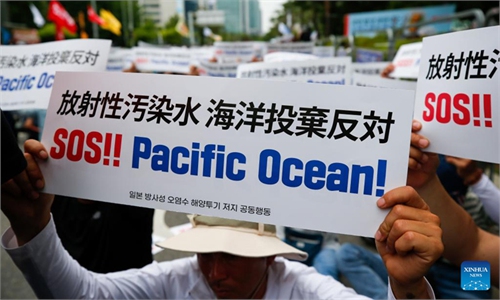
llustration: Xia Qing/Global Times
Japan insisting on discharging nuclear contaminated waste water into the sea has become a widely concerned issue as a public hazard. Reports show that Tokyo plans to start releasing as soon as late August. As the time for the dumping approaches, people are becoming more anxious. In the 1990s, Japan was a pioneer in opposing Russia's disposal of nuclear waste into the sea. What Tokyo is doing now highlights its inconsistency.In the early 1990s, after it was revealed that the Russia (Soviet Union) dumped radioactive waste and the estimated radioactive inventories several times from 1959 to 1992 in the waters near Japan, the latter called the Russian dumping extremely regrettable. Reports showed that in early 1993 the International Atomic Energy Agency (IAEA) already knew of Russia's plans to dump nuclear waste, but did not intervene, which is viewed as endorsement. Still, Japan demanded a permanent halt to the dumping. In 1993, the then Russian ambassador to Tokyo was summoned to the Japanese Foreign Ministry as officials there issued a statement of "strong regret."
At the same time, Japan carried out a number of investigations, both unilateral and multilateral. Prior to the Russian dumping in October 1993, Japan had conducted numerous studies to monitor the possible radioactive contamination of the Sea of Japan. After the October 17, 1993 dumping, Japan commissioned its research ship to take measurements in the dumping zone. In March 1994, a joint research expedition with government officials from Japan and scientists from Russia, South Korea, and the IAEA took seawater and seabed sediment samples at seven points in the Sea of Japan.
Japan also sought to constrain Russia through international rules. In 1972, the Convention on the Prevention of Marine Pollution by Dumping of Wastes and Other Matter (London Convention) was negotiated. It is a global treaty, for the first time, to regulate dumping of waste at sea worldwide. In 1990, Japan had been promoted the restrictions on relevant issues. Amendments adopted in 1993 (which entered into force in 1994) banned the dumping into sea of low-level radioactive wastes.
Taking history into consideration, what Japan is now promoting regarding nuclear contaminated waste water dumping has exposed its contradictions.
First, Japan once did not accept IAEA attitude and stance on Russia's dumping of nuclear waste, but now it takes IAEA's report as its greenlight of releasing. It once opposed Russia's similar decision with London Convention, but now it stresses a loophole of the convention: It only covers the dumping of waste from vessels, aircraft and other man-made structures at sea. It does not cover land-based discharges, as is occurring at Fukushima.
Second, Japan shows double standards regarding public welfare. In the past, Japan organized multiple investigations into Russia's disposal of wastewater in the sea. After levels of radioactivity at the dumping sites were found to be within normal background levels of radiation, it still demanded a permanent halt to the dumping. Now, despite the fact that there are several radioactive elements contained in the Fukushima contaminated water, such as carbon-14, strontium-90, considered as high-level hazardous radionuclides, Japan is still trying to persuade the public that the water is harmless.
Third, Russia discharged 900 tons of radioactive water in 1993. Japan, on the other hand, plans for continuous release of more than at least 1.2 million tons.
Fourth, in order to make Russia stop releasing, Japanese government took the decision to financially support the building of additional storage and processing facilities for nuclear waste. However, in terms of Fukushima nuclear contaminated waste water, it turns a blind eye to other options, including building new tanks or using it in concrete for structural applications where it has little contact with people and the environment. Releasing the water is only the cheapest option.
Fifth, Japan unveils its double standards regarding international community's participation in the solution. In Russia's case, Japan carried out both unilateral and joint on-site investigations. But so far, Japan shows no sincerity in involving the international community in the treatment of Fukushima's nuclear contaminated waste water and refuses to discuss alternative options beyond discharging it into the sea.
The ocean is fluid, open, and interconnected, and maritime issues are international in nature. The discharge of Fukushima's nuclear contaminated water into the sea is not Japan's internal affair but a common challenge for all humanity. Japan seems to have conveniently forgotten how it opposed Russia's nuclear waste discharge in the past.
The author is deputy director of the Institute of Maritime Strategy Studies at the China Institutes of Contemporary International Relations. opinion@globaltimes.com.cn


